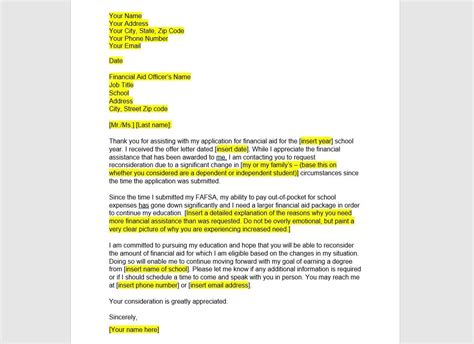When faced with the rising costs of education, financial aid can be a lifeline for students to access higher education. If you’ve received a financial aid award that you believe is inadequate, don’t give up hope. You can appeal the decision to increase your financial assistance.

Understanding the Financial Aid Appeal Process
The financial aid appeal process involves submitting a formal letter to the financial aid office at your institution. In this letter, you should outline the reasons why you believe your initial financial aid award needs to be increased or modified.
When Should You Consider an Appeal?
You may want to consider an appeal if you have experienced:
- A significant change in income or family circumstances
- An unexpected financial emergency or hardship
- Errors or omissions on your financial aid application
- Unusual or unforeseen expenses related to your education
Common Mistakes to Avoid
To increase your chances of success, it’s important to avoid common mistakes, such as:
- Not providing sufficient supporting documentation
- Submitting an incomplete or poorly written appeal letter
- Not following the institution’s specific appeal deadlines and procedures
- Making an emotional or unprofessional appeal
How to Appeal Financial Aid Step-by-Step
Step 1: Gather Supporting Documentation
Collect any documents that support your request for an appeal, such as:
- Proof of income or financial hardship
- Medical bills or receipts for unexpected expenses
- A letter from an employer or social worker verifying your situation
Step 2: Write a Compelling Appeal Letter
Your appeal letter should be:
- Clear, concise, and well-organized
- Factual and supported by documentation
- Polite and respectful, even if you’re frustrated
Step 3: Follow Institution Procedures
Contact your institution’s financial aid office to determine their specific appeal procedures and deadlines.
- Submit your appeal letter and supporting documentation on time.
- Make sure you follow any special instructions or requirements.
Step 4: Be Patient and Persistent
The financial aid appeal process can take time. Follow up with the financial aid office regularly to inquire about the status of your request.
- Be polite and respectful, even if you’re feeling frustrated.
- Show that you’re actively addressing any financial challenges you’re facing.
FAQs on Financial Aid Appeals
1. What are the most common reasons for financial aid appeals?
- Changes in income or family circumstances
- Unexpected emergencies or hardships
- Errors or omissions on the financial aid application
- Unusual or unforeseen educational expenses
2. How do I increase my chances of getting my financial aid appeal approved?
- Gather strong supporting documentation.
- Write a compelling and well-organized appeal letter.
- Follow institution procedures and deadlines.
- Be patient and persistent during the process.
3. Is it possible to get additional funding beyond my initial financial aid award?
Yes, it’s possible to negotiate an increase in your financial aid award through the appeal process.
4. What happens if my appeal is denied?
If your appeal is denied, you have the right to request a review by a higher authority within the institution.
5. Can I appeal financial aid denials based on merit or academic eligibility?
Financial aid denials based on academic merit or eligibility are generally not subject to the appeal process.
6. What if I’m unable to provide documentation to support my appeal?
In some cases, you may be able to provide a written explanation or statement in lieu of documentation. However, providing supporting evidence strengthens your appeal.
Creative Words to Sum Up the Appeal Process
PACT (Portability and Accountability of Comprehensive Techniques): A comprehensive approach to financial aid appeals involving gathering evidence, writing a compelling letter, following procedures, and being persistent.
Statistical Data on Financial Aid Appeals
- According to the National Association of Student Financial Aid Administrators (NASFAA), over 60% of financial aid appeals are approved each year.
- The average increase in financial aid awards approved through appeals is approximately $1,500.
- Students who provide strong supporting documentation and follow the appeal process carefully have a higher chance of success.
Tables for Quick Reference
Table 1: Reasons for Financial Aid Appeals
| Reason | Percentage of Appeals |
|---|---|
| Change in income or family circumstances | 35% |
| Unexpected emergencies or hardships | 25% |
| Errors or omissions on the financial aid application | 20% |
| Unusual or unforeseen educational expenses | 15% |
| Other | 5% |
Table 2: Appeal Process Deadlines
| Institution | Appeal Deadline |
|---|---|
| University of California, Berkeley | May 15 |
| Stanford University | June 1 |
| Harvard University | June 15 |
| Massachusetts Institute of Technology | July 1 |
| Yale University | July 15 |
Table 3: Supporting Documentation
| Document | Purpose |
|---|---|
| Tax returns | Proof of income and family circumstances |
| Pay stubs | Proof of income and employment |
| Bank statements | Proof of financial assets |
| Medical bills | Proof of medical expenses |
| Letter from employer or social worker | Verification of financial hardship |
Table 4: Recommended Tone and Language
| Tone | Language |
|---|---|
| Polite | Use respectful language and avoid accusatory or demanding language. |
| Factual | Support your claims with facts and evidence. |
| Professional | Use formal language and proofread your letter carefully. |
